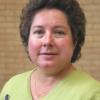This past weekend marked the launch of the Fall workshop series sponsored by the Religious Formation Conference. Entitled "Conversations at the Well: Crossing over to Meet the Other and Oneself", the program was led by speakers Teresa Maya, Congregation of the Sisters of Charity of the Incarnate, and Sophia Park, Sisters of the Holy Names of Jesus and Mary. From the outset we were invited to enter into the liminal space that surrounds each of us as well as all of us collectively.
There is something unsettling about liminality's blurry boundaries and unclear surroundings yet, as I continue to learn, it is unreal to expect complete certainly, clarity, and confidence. As much as l long to look out to a vast horizon where land and sky are clearly marked off, each to their own separate territory, there's also an unreachable "more" that stretches out beyond my grasp.
During the process employed on the opening evening of the workshop, we were asked to name our own liminal space at this time. In our reflection group, the three of us from the RFC staff simultaneously gave the same response: "Chicago." It isn't about the city or its particularly violent summer, nor its people or places. No, it is about the vulnerability of being new, of being unrooted, and of feeling dislocated.
A few short months ago the offices of the Religious Formation Conference moved to the city of Chicago. For me, this came after a short six months in our former home in Washington, D.C., as I had begun serving as RFC's executive director in January. While we all endorsed the move wholeheartedly (and continue to believe in it), we each experienced the departure from the familiar to the arrival in the new in our own unique manner and timing. Through it, I came to understand more fully that beyond the physical acts of sorting, packing, unpacking, and setting up, there are the deeper tasks and processes of letting go, bidding farewell, crossing over, and embracing the new. Unlike the rather discrete jobs of putting items in cartons on one end and taking them out at the other, there are no clear demarcations in the spirit work of leaving one home and putting down roots in a new one.
From the outset of our moving process, my colleagues and I sensed that our journey as individuals and as a conference was not unrelated to those of our members and of our member congregations. We are not the only group that has sorted through years of files, trying to decide what we can let go of and what we might need in the future. Many others have stood on the sidelines as their furniture and files, their decorations and details, and their makings and memories were wheeled past them by swift-footed workers in short time. Haven't we wanted to advise the seeming uncaring moving folk, "Be careful, that's a piece of my life that you are transporting!"
As I observed the dismantling of our office as well as those of other occupants in our building, I had a gnawing sense within me that this will not be the last time I go through this emptying process. I wondered what other places I will be called to let go of in the years ahead. A sobering pondering, to be sure.
Just as the leaving entails many kinds of goodbyes so, too, there are numerous forms of welcome in the new. There are new doors and locks to open, new faces and names to learn, and new windows and views to behold. It is both consoling and disorienting to see the old, familiar office furnishings in a new setting, for I know that they will not be the same here. There are new ways to be, to see, and to do.
Similar to congregations that have moved to new homes which they will share with others, we are finding our way in a place that is already familiar space to other groups and organizations. We are the new folks, seeking to forge connections with those who go about their daily work with a well-established pattern and beat. How do we assimilate and accommodate and how do we enter into the transformative process with others?
Our liminality is before our eyes these days; it takes no lengthy discernment process to name it. Everything is both familiar and unfamiliar, named and unnamed, known and unknown. Certainty seems a thing of the past as the reality of vulnerability sinks in; it holds both threat and promise. There are the risks of unknown dangers, unforeseen consequences, and unanticipated hurt but there is also the invitation to life in the full. Without the certainty of the past and a clear vision of the present, might we be more open to trust in the Other at times such as these?
The letting go is painful without a doubt, but the promise of new life in a new place and time lures me to consent. I'm not sure that I would purposely seek out the liminal, but seeing with new eyes and experiencing hints of presence in the emptiness bolsters my uncertain mind and heart to continue to cross over to this new space to meet the Other in others as well as in myself.
[Ellen Dauwer, SC, is a Sister of Charity of Saint Elizabeth of Convent Station, New Jersey, currently living in Chicago. She spent 20 years in higher education, teaching educational technology and serving in administration. She recently completed eight years in congregational leadership and began as executive director of the Religious Formation Conference in January.]
